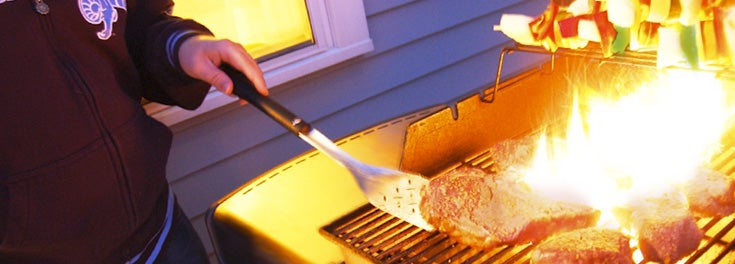
Grilling season is in full swing, and the age-old question hangs in the air: Would you like a side of carcinogenic heterocyclic amines with your porterhouse? That black stuff you love so much on your grilled meat is nearly as bad as eating soot from your fireplace and can actually be hazardous to your health.
Together, these researchers have attracted more than $90 million in grants to change the way we think about —and detect and treat—cancer. If you’ve got big ideas about fighting killer diseases, URI wants you.
The compounds in the char are not found in normal meat and chicken, but are mutagens created by the heating. “In fact, a recent study found that eating charred meat on a regular basis may increase risk of pancreatic cancer by up to 60 percent,” says Biomedical and Pharmaceutical Sciences Professor Bongsup Cho, who has spent the past 25 years examining the DNA damage caused by consuming carcinogens and ceratin drug molecules. His work is funded by the National Institutes of Health and the American Cancer Society.
But the carcinogenic danger of culinary overkill isn’t all URI is doing in the area of cancer prevention and treatment of cancer. Biophysicists Yana Reshetnyak and Oleg Andreev have discovered and patented a technology that can locate a cancerous tumor and deliver cancer-fighting drugs into the tumor without harming surrounding healthy cells. Their work could revolutionize cancer detection and treatment.
Biosciences grad Caroline Killian collaborated with Pharmacy Professor Navindra Seeram to study the anti-cancer properties of the Jamun berry, which is traditionally used as a pre-insulin treatment for diabetes. Caroline dared to ask what kind of healing power it might have against cancer. Turns out, it inhibits cell growth in a particularly aggressive type of breast tumor. Now Caroline is continuing her work as a Pharmacy grad student with Professor Seeram.
URI’s Cancer Prevention Research Center is a premier center for behavioral psychology, where Professor of Clinical and Health Psychology James Prochaska developed a revolutionary model of behavior change that’s been applied worldwide to such cancer-causing behaviors as smoking, sun exposure, and unhealthy eating. In fact, he’s the principal investigator on more than $70 million in research grants for cancer prevention through behavior change.
For pharmacy grad Jessica Lehmann, whose mother is a cancer survivor, the fight against killers like cancer is personal. She worked with Pharmacy Professor Keykavous Parang on the study of a certain protein linked to breast, colon, and other sporadic cancers. Professor Parang’s research can be described as the application of chemistry to anti-cancer drug design and delivery. Supported by the American Cancer Society and the National Science Foundation, he’s working on a way to block the overproduction of certain enzymes and to deliver anti-cancer drugs specifically to the tumor, both without harming normal cells. The American Cancer Society is funding his cell and chemistry-based research to develop new compounds that inhibit overproduction of that protein.
Together, these researchers have attracted more than $90 million in grants to change the way we think about—and detect and treat—cancer. If you’ve got big ideas about fighting killer diseases, URI wants you.
